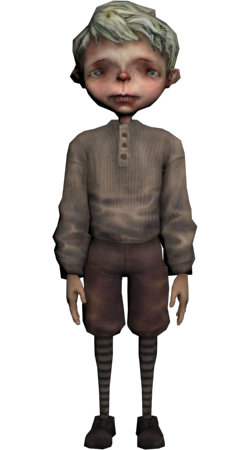| Charlie | |
|---|---|
| Biographical information | |
| Provenance | London |
| Physical description | |
| Gender | Male |
| Hair color | Blond |
| Image gallery (1) | |
| “ | It's my turn to forget, Alice!
|
” |
Charlie is an unfortunate boy and an orphan who resides at the Houndsditch Home for Wayward Youth.
History
Before Madness Returns
According to Dr. Angus Bumby, Charlie was beaten by his abusive mother. In response, his father killed his mother, and as a result, his father received the death penalty by hanging. Both of his parents' deaths led him to the orphanage, while the trauma from being beaten by his mother led him to therapy sessions with Bumby.[1]
Alice: Madness Returns
After Alice's session with Bumby, the doctor tasked her to pick up medicine at the pharmacist and call Charlie. When Alice opened the door, Charlie was outside waiting and cheerfully exclaimed to her that it was his turn to forget his memories.[1]
It is unclear what Charlie's fate is, as well as the fate of the other orphans. If Charlie was not sold as a child prostitute during the game, then he was presumably saved after Alice realized the truth and killed Bumby.
Appearance
Charlie is a blond haired boy. His shirt is blue and his trousers are black, both look worn and faded just like most other residence at the home. His voice is fairly high-pitched and comical and he has a round head, button nose, small eyes, and fairly wide lips.
Trivia
- It can be assumed that Charlie became one of Bumby's child prostitutes as he, unlike Alice, is quite willing to forget his past.[1]
- When Charlie appears, Bumby says, "Now Charlie, your Pa was hung for killing your Ma, who beat you." This can be seen as a very blunt and insensitive thing to say to an abuse victim, especially to a child by a therapist, as it forces Charlie to recall his trauma. However, this could also foreshadow Bumby's role as someone who doesn't really care about the children at his orphanage that much and their emotional well-being. In the end, it is heavily implied Bumby is only doing therapy for the end result: the money and profit he receives from selling these children.
References
- ↑ 1.0 1.1 1.2 Spicy Horse (2011-06-14). Alice: Madness Returns. (Electronic Arts). Scene: Houndsditch Home. Level: Chapter 1: Hatter's Domain.

